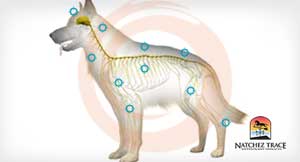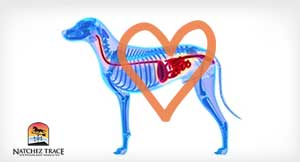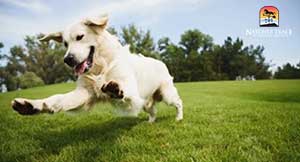 If you’ve ever wondered about alternative ways to keep your furry friend healthy and happy, you might have come across the term “acupuncture for dogs.”
If you’ve ever wondered about alternative ways to keep your furry friend healthy and happy, you might have come across the term “acupuncture for dogs.”
It’s not as complex as it sounds! In fact, it’s an ancient practice that involves tiny needles and can offer your pup relief from various health issues.
This article will shed light on canine acupuncture, its benefits, and how it works. Together let’s discover how this age-old practice could be a game-changer for your dog’s well-being.
Decoding Acupuncture for Dogs: What You Need to Know
Acupuncture for dogs involves a centuries-old practice that uses fine needles strategically placed on specific points on a dog’s body.
 These points align with energy pathways called meridians. When these pathways are disrupted, it can lead to various health issues in our canine companions. Acupuncture aims to restore the balance of energy flow along these meridians.
These points align with energy pathways called meridians. When these pathways are disrupted, it can lead to various health issues in our canine companions. Acupuncture aims to restore the balance of energy flow along these meridians.
This traditional therapy isn’t a new fad; it has been used for a long time to alleviate discomfort and promote wellness in dogs. By leveraging these targeted needle placements, acupuncture helps manage pain, address certain health conditions, and support the overall well-being of our four-legged friends.
The concept is simple, yet the results can be significant, offering a complementary approach to conventional veterinary care. Through this method, many pet owners have witnessed improvements in their dogs’ health and vitality.
Watch Dr. Smith demonstrate targeted needle placements to manage pain, address chronic health conditions, and support the overall well-being of our four-legged friends in the following video.
Is Acupuncture Used Only For Humans?
It’s natural to wonder if something like acupuncture, often associated with humans, can really work for our canine pals. The good news is that yes, acupuncture does work for dogs, and here’s why:
- Scientific Backing: Acupuncture triggers the release of endorphins, the body’s natural painkillers, which help reduce discomfort in dogs. This study demonstrates the effectiveness of acupuncture as a pain management tool.
 Historical Evidence: Acupuncture has been practiced for centuries, and its efficacy isn’t limited to humans. Over time, numerous success stories and empirical evidence have showcased the positive impact of acupuncture on dogs, demonstrating its therapeutic benefits.
Historical Evidence: Acupuncture has been practiced for centuries, and its efficacy isn’t limited to humans. Over time, numerous success stories and empirical evidence have showcased the positive impact of acupuncture on dogs, demonstrating its therapeutic benefits.- Vet Recommendations: Many veterinary professionals advocate for acupuncture as a complementary therapy. Veterinarians trained in acupuncture use it alongside conventional treatments, observing positive outcomes in their canine patients.
- Pet Owner Experiences: Countless pet owners have seen remarkable improvements in their dogs’ health after incorporating acupuncture into their treatment plans. They often report increased mobility, reduced pain, and enhanced overall well-being in their furry companions.
Countless pet owners have seen remarkable improvements in their dog’s health after incorporating acupuncture into their treatment plans. As evident in this video, Dr. Smith helps an older dog, Lily, regain movement with acupuncture.
While individual responses may vary, the consensus among experts and experiences from pet owners demonstrates that acupuncture is indeed an effective and valuable treatment option for dogs.
How Dogs Benefit from Canine Acupuncture
Acupuncture isn’t just a human thing—it’s a beneficial treatment for our canine companions too. So, how does this ancient practice benefit dogs? Let’s dig into the ways it helps our furry friends.
- Pain Management: Dogs, especially older ones dealing with arthritis or joint issues, find relief through acupuncture. Those tiny needles work wonders by reducing discomfort and improving mobility.
 Stress Relief: Like us, dogs can get stressed or anxious. Acupuncture helps to calm them down, whether they have separation anxiety or nervousness during thunderstorms. It’s a natural way to soothe their nerves.
Stress Relief: Like us, dogs can get stressed or anxious. Acupuncture helps to calm them down, whether they have separation anxiety or nervousness during thunderstorms. It’s a natural way to soothe their nerves.- Faster Healing: When dogs face injuries or surgeries, acupuncture steps in as a supportive therapy. It speeds up the healing process, getting them back on their paws more quickly.
- Improved Digestion: Upset tummies are no fun for anyone, especially our pups. Acupuncture aids in resolving digestive issues like vomiting or constipation, promoting better gut health.
- Skin Conditions: Dogs with skin problems or allergies find relief with acupuncture as a complement to traditional treatments. It soothes their skin and reduces allergic reactions.
Overall, acupuncture isn’t just about poking needles into the skin; it’s a gentle, holistic approach that supports your dog’s well-being in various ways.
Conditions Treated with Canine Acupuncture
Acupuncture for dogs isn’t a one-size-fits-all solution, but it’s pretty versatile in addressing various health issues in our beloved furry companions. Here are some of the conditions where canine acupuncture can make a real difference:
 Digestive Disorders: Dogs can struggle with digestive issues like vomiting, diarrhea, or constipation. Acupuncture helps regulate the digestive system and promotes better gut health.
Digestive Disorders: Dogs can struggle with digestive issues like vomiting, diarrhea, or constipation. Acupuncture helps regulate the digestive system and promotes better gut health.- Skin Problems and Allergies: Itchy skin and allergic reactions are quite common among dogs. Acupuncture complements traditional treatments, reducing skin discomfort and minimizing allergic responses.
- Neurological and Musculoskeletal Issues: From paralysis to musculoskeletal problems, acupuncture can be part of a treatment plan for these issues. It aids in managing pain and promoting mobility in affected dogs.
- Respiratory Problems: Dogs might face breathing difficulties or chronic respiratory issues. Acupuncture can contribute to improving their respiratory function and overall breathing comfort.
- Stress and Anxiety: Just like humans, dogs can be diagnosed with anxiety disorders. Acupuncture helps in calming them down, reducing their anxious behavior, and promoting a sense of relaxation.
By no means is this an exhaustive list, but it showcases the diverse range of conditions where acupuncture for dogs can play a significant role in their treatment and well-being. Each dog’s response to acupuncture may vary, but many have found relief and support through this holistic approach.
Conclusion:
 Canine acupuncture isn’t just an ancient practice; it’s a pathway to supporting our furry friends in their journey to better health and well-being. This holistic approach, involving the strategic placement of fine needles, offers a multitude of benefits for our canine companions.
Canine acupuncture isn’t just an ancient practice; it’s a pathway to supporting our furry friends in their journey to better health and well-being. This holistic approach, involving the strategic placement of fine needles, offers a multitude of benefits for our canine companions.
From managing pain and stress to aiding in faster recovery and addressing a variety of health conditions, acupuncture proves to be a valuable adjunct to conventional veterinary care.
The centuries-old practice, backed by both historical evidence and modern scientific support, has shown its effectiveness in enhancing the lives of dogs.
By restoring the balance of energy flow and promoting the body’s natural healing mechanisms, acupuncture stands as a gentle, yet powerful, complementary therapy for dogs. Through the experiences of both veterinary professionals and countless pet owners, the positive impact on dogs’ health is evident.
 In considering the well-being of our furry companions, exploring alternative therapies such as acupuncture opens doors to a more comprehensive approach to their health.
In considering the well-being of our furry companions, exploring alternative therapies such as acupuncture opens doors to a more comprehensive approach to their health.
By embracing this ancient practice, pet owners can provide their dogs with additional support and care, ultimately contributing to their improved quality of life.
Should you seek further information or guidance on acupuncture for dogs, consulting with Dr. Smith is your best bet for tailored advice and treatment.
People Also Ask:
- Are there side effects to canine acupuncture? Acupuncture is a favorable form of treatment because it lacks potential side effects, unlike prescription and OTC medicines.
- How does a typical acupuncture session work? By targeting specific areas, the acupuncture needles trigger the immune system and increase blood flow.
- How long are the sessions? Each session is different and depends on the pet’s condition and the severity of the disease. Sessions can range between twenty to forty minutes and begin with several sessions in a week, eventually tapering down to fewer treatments.








